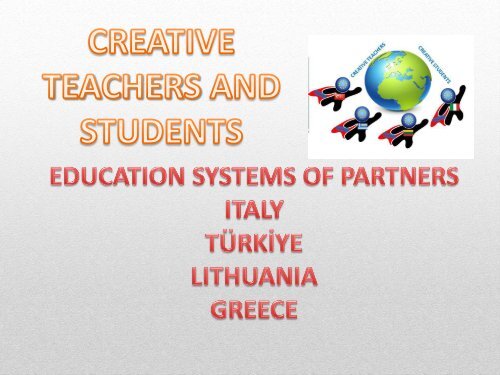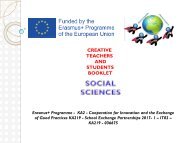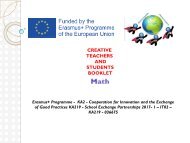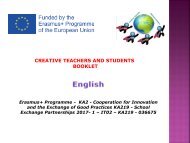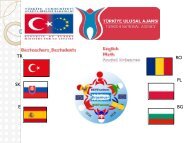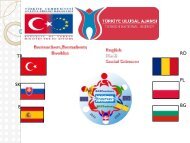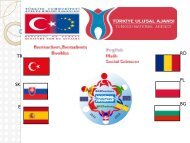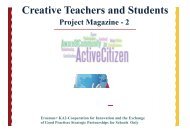emagazine
Educational System
Educational System
You also want an ePaper? Increase the reach of your titles
YUMPU automatically turns print PDFs into web optimized ePapers that Google loves.
The Italian School System<br />
Antonio Iaconianni (Dirigente Scolastico, Liceo Classico<br />
«Bernardino Telesio» Cosenza)<br />
Translator: Prof.ssa Catia Mele (Erasmus plus project coordinator)
First cycle – nursery school, primary and lower secondary<br />
school, (from 6 to13 )<br />
Second Cycle (Scuola secondaria di secondo grado): Liceo (classic,<br />
scientific, linguistic, applied science, socio-psycho-pedagogical, musica, European,<br />
artistic), Technical Education: Building Surveying and Construction, Industrial,<br />
Commercial, Administrative, Graphic Arts, Agricultural, Tourism and Marketing.<br />
Vocational Institutes :Agricultural, Hotel Trading and Catering, Commercial,<br />
Industrial, Mechanical, Administrative, Social Services - 5 years (from 14 to 19 )<br />
Compulsory Education and Training until 18 years of age<br />
The Italian Law provides AT LEAST 10 years of compulsory education and training<br />
activities until 18 years of age. After the exam at the end of the 1° cycle (Scuola<br />
Media-Junior School), pupils can choose which educational area to follow.<br />
After 16 years of age, pupils can choose whether studying or, if they like, going to<br />
school and work at the same time.
MIUR<br />
REGIONS<br />
(SCHOOL<br />
DESIGN)<br />
SCHOOL<br />
REGIONAL BOARD<br />
(Professional<br />
Resources)<br />
REGION<br />
=<br />
EDUCATION<br />
AUTHORITY<br />
MUNICIPALITY<br />
AND PROVINCE<br />
(School Building)<br />
SCHOOL
SCHOOL BOARD ORGANIZATIONAL CHART: THE<br />
HEAD MASTER DEALING WITH THE DIDACTIC,<br />
MANAGING ADMINISTRATIVE DIMENSION AND THAT<br />
OF PARTICIPATION
COLLEGIAL BODIES (from 1974)
Continuity of the educational approach – vertical integration<br />
system<br />
Several school streams with an emphasis on personalized<br />
learning paths.<br />
Inclusion and school equity.
A reform for a new autonomy of school:<br />
organization, management, and pedagogy.
ORGANIZATION, ECONOMICAL AND DIDACTIC<br />
AUTONOMY<br />
ELABORATION OF A RICH EDUCATIONAL PROJECT PLAN (pof)<br />
OPENNESS TO THE TERRITORY, PARTICIPATION TO A NET OF<br />
SCHOOLS, COLLABORATION WITH LOCAL INSTITUTIONS.
School autonomy in Italy: a key of development and<br />
an answer to the context’s needs<br />
The Art. 117 of our Constitution pledges schools autonomy. This means that each<br />
school can take autonomous decisions as regards didactic issues, school<br />
organization and experimentation, research and development respecting national<br />
and regional rules.
Italian school reformation: law<br />
107/2015<br />
Empowerment<br />
of school<br />
autonomy<br />
Empowerment<br />
of professional<br />
resources<br />
Professional<br />
development<br />
and<br />
compulsory<br />
teacher<br />
training<br />
Openness to<br />
territory and<br />
community<br />
(Nets /<br />
Partenships)
Primary Formative Objectives of (LEGGE 107/2015, c. 7)<br />
1)L1 and L2 skills;<br />
2)Maths and scientific skills;<br />
3)Artistic practical skills (artistic heritage, cinema, theatre, music), enhancing<br />
collaboration with museums;<br />
4)Active and democratic citizenship skills;<br />
5)Legal education;<br />
6)Developing a responsible behaviour to respect the<br />
environment and the artistic and cultural heritage;<br />
7) Art literacy ;<br />
8) Sport et health;<br />
9) Number skills;<br />
10)Developing cooperative didactic methods (laboratories; Cooperative<br />
Learning; etc.);<br />
11) prevention to fight school drop-out, bullying; reinforcing inclusion;<br />
12) Openness to the territory, extracurricular activities ;<br />
13) Reinforcement of professional stages in the upper secondary school;<br />
14) Valorisation of didactic and individualized paths;<br />
15) Improving Italian language skills as a second language<br />
16) Elaboration of a structured orientation system.
Managers’ Evaluation<br />
(since 2016/17)<br />
- The general criteria concern mainly the outcome assigned to the school<br />
manager by the general director on the basis of the needs and the context<br />
of the school<br />
-The basic evaluating principles are global management skills in school<br />
ruling.
School managers’s evaluation is proposed as an instrument<br />
of support for the managing personnel<br />
Evaluation is regulated by the «nuclei di valutazione»<br />
(core evaluation) composed by three members, 2 school<br />
managers, 1 inspecteur or 1 expert
PORTFOLIO to be filled in by the school manager<br />
1) PRESENTATION (compulsory) OF QUALIFICATIONS,<br />
STUDIES, PROFESSIONAL EXPERIENCE;<br />
2) SELF-EVALUATION (optional) ON:<br />
a) Management and communicative skills within the school<br />
community;<br />
b) Reinforcing public relations skills with the territory;<br />
c) Professional resources evaluation ;<br />
d) Economic/administrative management ;<br />
e) Social report / means of service evaluation<br />
3) DESCRIPTION OF ALL ACTIONS UNDERTAKEN TO<br />
REALISE THE MISSION OBJECTIVES ASSIGNED BY THE<br />
GENERAL DIRECTOR (SCHOOL LEVEL)
Traditional<br />
staff<br />
Staff<br />
reinforcement<br />
Autonomy<br />
staff<br />
Benefits for<br />
- Organization<br />
- Didactic<br />
experiment<br />
- Projects<br />
- Public<br />
relations<br />
- Innovation<br />
Staff inside an educational<br />
establishment
PROFESSIONAL<br />
RESOURCES<br />
Evaluation group<br />
for recognizing<br />
teachers’<br />
performance<br />
School<br />
manager<br />
recruits<br />
directly<br />
teachers<br />
School managers<br />
recognizes those teachers<br />
to be valorized
The SCHOOL MANAGER is<br />
evaluating teachers<br />
- It is the big news introduced by the reform « LA BUONA SCUOLA»<br />
- The process is based on general criteria established by an “evaluation<br />
committee” composed by:<br />
A) THE SCHOOL MANAGER;<br />
B) 3 TEACHERS;<br />
C) 1 STUDENT ( IN SECONDARY SCHOOLS);<br />
D) 1 PARENT<br />
E) 1 REPRESENTATIVE OF THE PERIPHERICAL ADMINISTRATION<br />
(INSPECTOR OR SCHOOL MANAGER FROM ANOTHER SCHOOL)<br />
- THE CRITERIA MUST BE PUBLISHED AS WELL AS THE ECONOMIC<br />
RESOURCES DESTINED TO THE EVALUATING PROCESS.
ELEMENTS FOR ATTRIBUTING A «BONUS» TO<br />
TEACHERS’ PROFESSIONAL MERIT<br />
1) Quality of teaching, participation in the process of school<br />
development and students’ school success<br />
2) Results obtained by a teacher or a group of teachers referring to<br />
the development of students’ skills . didactic and methodological<br />
innovation , didactic and documentary research, spreading of<br />
good practice.<br />
3) Responsibilites achieved in school management, didactics and<br />
staff training.
SCHOOL BETWEEN PARTICIPATION,<br />
OPENNESS TO THE CONTEXT<br />
(STAKEHOLDERS) AND «SOCIAL REPORT»<br />
(social responsibility)
School service evaluation in Italy<br />
NATIONAL<br />
• Standardized test «INVALSI»<br />
- Primary school - second and fifth class;<br />
- Final college year (diploma);<br />
- 2°year of secondary school /<br />
end of compulsory education<br />
- From 2018: English test at<br />
primary school (5th year);<br />
abolition of final general test<br />
at diploma; introduction of<br />
a test during the last year of<br />
secondary school<br />
Institution<br />
School self evaluation system, aimed<br />
at promoting a culture of evaluating<br />
teaching and learning.:<br />
- the RAV ( EVALUATION<br />
REPORT)<br />
- Plan of improvement
“Added value”<br />
(INDIVIDUAL SCHOOL<br />
LEARNING RESPONSE)
Dropping out<br />
Italian school’s strategic priority is inclusion<br />
- Individual didactic education<br />
- Supporting with a psychological listening service those learners with<br />
difficulties<br />
- Reorienting students with difficulties along the whole school year (link<br />
between schools –passerelle)<br />
- Didactic experiment ( digital technology, peer learning)<br />
- Working on individual motivation:<br />
Expressive laboratories (music, theatre, art)<br />
- Prevention: counseling and verticalization of educational paths
The Reform of Italian school: Law<br />
107/2015<br />
Work-related learning<br />
During the last three years of<br />
secondary school, students must<br />
follow: 200 hrs at Liceo and<br />
400 hrs at Technical ad Vocational<br />
Institutes
Digital school is not<br />
an educational system<br />
based on computers<br />
and technology, but<br />
it is a different way<br />
to conceive school<br />
organization and its<br />
pedagogical<br />
approach<br />
Creation of a «team for innovation »<br />
identifying a « digital animator» whose<br />
function is promoting the process of<br />
innovation in each school
THE REFORM OF LA «BUONA SCUOLA» :<br />
- CHANGING OF MENTALITY<br />
- PEDAGOGICAL STRATEGIES MUST BE DEVOLOPED BOTTOM-<br />
UP, FOCUSSING ON THE LEARNING PROCESS NEEDS<br />
- TEACHER TRAINING NATIONAL PLAN
Some considerations to<br />
share…<br />
PRIORITY OF TEACHERS LIFELONG LEARNING (FOCUS ON SCHOOL<br />
NEEDS );<br />
REINFORCING «TEAM WORKING» (TEAMS MUST WORK ON CLEAR<br />
OBJECTIVES AND MUST BE RESPONSIBLE FOR RESULTS);<br />
EFFECTIVENESS OF MANAGEMENT ON SMALL PROFESSIONAL<br />
GROUPS (TO IDENTIFY IN EACH SHOOL= MOTIVATION;<br />
VALORIZATION; IMPLICATION OF PERSONNEL ON A REAL TERRAIN );<br />
RENFORCING SCHOOL AUTONOMY TO INCREASE EDUCATION<br />
EFFECTIVENESS
« LESSON STUDY»:<br />
AN EFFECTIVE EXPERIENCE FOR PROFESSIONAL DUTY AND LLL<br />
From the beginning of the 21°<br />
century, such a process has met an<br />
important international success.<br />
The LS can be seen from several points<br />
of view. Insisting on their cooperative<br />
aspect, they are an important<br />
instrument for teacher training, an<br />
occasion to develop resources and<br />
teacher’s research, a subject for<br />
research, a link between theory and<br />
practice and finally a link among<br />
school educational professionals.
OBSERVATION AS A MEANS OF RENFORCEMENT FOR<br />
PROFESSIONAL TEAMS AND CONSTANT TRAINING
CREATIVE TEACHERS AND STUDENTS
• Primary<br />
School<br />
• Preschool<br />
Preschool<br />
Primary<br />
School<br />
University<br />
Hıgh<br />
School<br />
• University<br />
• Hıgh<br />
School
Compulsary at the age of 6
PRIMARY SCHOOLS
Compulsary at the age of 7 and lasts 8 years(4+4)<br />
First 4 year is called “İlkokul”
Second 4 year is called “Ortaokul”
They have 2 hours English classes in a week at the 2nd 3rd and 4th grade<br />
,15 hours English Classes at the 5th ,4 hours English Classes at the<br />
6th,7th and 8th grade
While having the “MIS” exam
According to the exsam results , they can choose their High School
High Schools<br />
Science High schools<br />
SocialSciences High school<br />
Anatolian High school<br />
Vocational highschools
Hıgh Schools<br />
High schools are 4 years in Turkey<br />
But Social sciences high schools are 5 years<br />
(1+4)<br />
1 year for prep classes
GAZİ SOCIAL SCIENCES HIGH SCHOOL<br />
In our school in prep classes ,<br />
we have 35 hours in a week<br />
.In other grades we have 40<br />
hours classes<br />
And our classes are English ,<br />
Maths , Science,Biology,Turkish<br />
Literature ,German ,Physical<br />
Education , Geography
ISPARTA ANATOLIAN HIGH SCHOOL<br />
In our school, we have 40<br />
hours in a week . If the<br />
students want they can join<br />
the school courses after<br />
classes.<br />
And our classes are English ,<br />
Maths , Science, Turkish<br />
Literature ,German ,Physical<br />
Education , Geography, ICT
Students have to take an exam after high school
According to their exam results they can choose their<br />
faculties or departments at the university<br />
•
Universty<br />
2 years associate degree<br />
4 years Bachelor’s degree<br />
6 years master degree
Faculty of medicine is 6 years
Atatürks says
Secondary education<br />
programme<br />
2017.11.07
Content of secondary education<br />
Compulsory part (compulsory and compulsory<br />
chosen subjects and/or modules);<br />
Optional part (courses of subjects and/or modules<br />
prepared according to students’ needs and<br />
Educational Programs)
The structure and content of<br />
secondary education<br />
Compulsory subject<br />
Optional course<br />
Moral education Ethics (B course) Religion (B course)<br />
Lithuanian and literature A course B course<br />
Mathematics A course B course<br />
Physical education<br />
Physical education (A<br />
course)<br />
Physical education (B<br />
course)<br />
Aerobics (B course)<br />
Basketball (B course)<br />
Football (B course)<br />
Volleyball (B course)
Compulsory Subject Course<br />
Foreign language (one<br />
subject is compulsory)<br />
Social education (one<br />
subject is compulsory)<br />
Natural sciences (one<br />
subject is compulsory)<br />
Art and technologies (one<br />
subject is compulsory)<br />
English<br />
Russian<br />
French<br />
History<br />
Geography<br />
Integrated course of History and<br />
Geography<br />
Biology<br />
Chemistry<br />
Physics<br />
Integrated course of natural sciences<br />
Art<br />
Music<br />
B1 or B2 (course is<br />
assessed in the 2 nd form<br />
in spring)<br />
A or B<br />
A or B<br />
B<br />
A or B<br />
A or B<br />
A or B<br />
B<br />
A or B<br />
A or B<br />
Dance<br />
Technological education<br />
Graphic design<br />
Photography<br />
A or B<br />
A or B<br />
A or B<br />
A or B
Optional subjects<br />
Optional subjects<br />
Information technology A or B<br />
Use of English<br />
Rhetorical art<br />
Systems of equation<br />
Mathematical calculations in Economics and finance<br />
Economics and enterprise<br />
Lithuanian national interests<br />
Lithuania in the period of occupation and annexation<br />
Psychology<br />
Drawing<br />
French. Elementary level (the 3 rd language)<br />
Modules<br />
Information technology<br />
English<br />
Lithuanian and literature<br />
Mathematics<br />
Physics<br />
Chemistry<br />
Biology<br />
History
Individual plan<br />
Individual plan is compulsory for everyone, who studies<br />
according to the programme of secondary education.<br />
There are shown subjects or groups of subjects, courses,<br />
number of lessons, optional subjects, modules.<br />
Student combines his individual plan with gymnasium<br />
opportunities or chooses from offered options.<br />
Minimal amount of lessons per week 28 hours, maximum<br />
– 35 hours per week.
Recommendations<br />
Lithuanian and literature and mathematics advanced course<br />
in the 3 rd or 4 th form is recommended to choose, when an<br />
assessment of Foundation Education test results are not<br />
lower than 6.
Recommendations<br />
Foreign languages. If a student from an achievement test<br />
reached:<br />
B1 level, according to secondary education programme it is<br />
suggested to choose B2 level,<br />
A2 level, according to secondary education programme it is<br />
suggested to choose B1 level,<br />
A1 level, according to secondary education programme A2<br />
level.
Exchange procedure of subjects’ courses, modules, optional<br />
subjects<br />
Refuse or choose a new subject, module or change the course,<br />
student can at the end of the semester or at the end of the<br />
school year.<br />
A student, who has decided to change his individual plan, 3<br />
weeks before the end of semester or a school year needs to:<br />
Write a motivated application to the headmaster of the<br />
gymnasium<br />
Combines a change in the individual plan, individual timetable<br />
with an assistant director<br />
If a student wants to choose the subject, which he has not got<br />
before or change a course from lower to a higher one, he<br />
needs to prepare individually and pass a credit.
Maturity examinations<br />
State examinations are conducted centrally – pupils<br />
of the graduation forms are registered in the database<br />
of the National Examination Centre, examinations are<br />
taken in municipal examination centres.<br />
Having completed the secondary education<br />
programme and passed 2 examinations, school –<br />
leavers obtain secondary education.
Maturity examinations<br />
A student must pass Lithuanian language and one<br />
optional examinations if he wants to gain Maturity<br />
Sertificate.<br />
There are state – funded places at universities and<br />
colleges. In this case a student needs to pass<br />
Mathematics and English language examinations.
Education in Greece<br />
The Greek educational system is mainly divided into three levels: primary,<br />
secondary and tertiary, with an additional post-secondary level providing<br />
vocational training.<br />
<br />
<br />
<br />
Primary education is divided into kindergarten lasting one or two years, and<br />
primary school spanning six years (ages 6 to 12).<br />
Secondary education comprises two stages: Gymnasio (variously translated as<br />
Middle or Junior High School), a three-year school, after which students can<br />
attend Lykeion or Vocational lykeion.<br />
Higher Tertiary education is provided by Universities, Technological<br />
Universities (T.E.I.) and Academies which primarily cater for the military and<br />
the clergy. Undergraduate courses typically last 4 years (5 in polytechnics and<br />
some technical/art schools, and 6 in medical schools), postgraduate (MSc level)<br />
courses last from 1 to 2 years and doctorates (PhD level) from 3 to 6 years.
All levels are overseen by the Ministry of Education, Research and Religious Affairs. The Ministry exercises<br />
centralized control over state schools, by prescribing the curriculum, appointing staff and controlling<br />
funding. Private schools also fall under the mandate of the Ministry, which exercises supervisory control<br />
over them. At a regional level, the supervisory role of the Ministry is exercised through Regional<br />
Directorates of Primary and Secondary Education, and Directorates of Primary and Secondary Education<br />
operate in every Prefecture. Tertiary institutions are nominally autonomous, but the Ministry is<br />
responsible for their funding, and the distribution of students to undergraduate courses. Currently the<br />
Greek government only recognises the degree programmes offered by the state-run universities although<br />
there are several private universities and colleges offering degree programmes that are validated and<br />
overseen by American, British and other European universities. The Greek government is pressured to<br />
recognise these overseas programmes.<br />
All levels of education are catered for by both private and public schools. State-run schools and<br />
universities do not charge tuition fees and textbooks are provided free to all students, although, from<br />
2011 onwards, there has been a noticeable shortage of new textbooks, forcing students to either buy<br />
stock books from bookshops, or participate in parent-teacher association-run book trades. There are also<br />
a number of private tutorial schools, colleges and universities operating alongside the state education and<br />
providing supplementary tuition. These parallel schools (Greek: φροντιστήριο, frontistirio (singular))<br />
provide foreign language tuition, supplementary lessons for weak students as well as exam preparation<br />
courses for the competitive Panhellenic national examinations. Most of the students typically attend such<br />
classes (and examinations) at the tutors schools in the afternoon and evening in addition to their normal<br />
schooling.
Primary education<br />
Before the Elementary school, kids must attend the Kindergarten from age 5 to 6 before moving to the<br />
Elementary School.Elementary schools are called "Dimotiko" (demotic, meaning municipal), a carryover term<br />
from a time when such schools were run by local communities. The name remains although it has been<br />
obsolete for decades. In the first two years pupils are not officially graded, and parents obtain feedback<br />
about their performance via oral communications with teachers. Grading begins in Year 3, and written exams<br />
are introduced in Year 5. Graduating from one year to the next is automatic, and pupils with deficient<br />
performance are given remedial tutoring.<br />
Years are called "classes", from first to sixth:<br />
1st Year : age 6 to 7<br />
2nd Year : age 7 to 8<br />
3rd Year : age 8 to 9<br />
4th Year : age 9 to 10<br />
5th Year : age 10 to 11<br />
6th Year : age 11 to 12<br />
A normal school-day starts at 8.15 and finishes in 13.15. The classes last between 45 and 90 minutes with 3<br />
breaks. The school year always starts on September 11 and ends on June 15. The students have summer<br />
vacation (about 3 months), Christmas vacation (2 weeks) and Easter vacation (2 weeks). Furthermore,<br />
students take usually another four days off in order to celebrate their two national holidays (28/10 and 25/3).
Gymnasium - Middle School (compulsory education)<br />
1st grade, age 12 to 13<br />
2nd grade, age 13 to 14<br />
3rd grade, age 14 to 15<br />
Starts on September 11 and ends on early June before the first day of the Panhellenic exams. The lessons end<br />
in 31 May so that the students will be able to study for their examinations in early June. The classes start at<br />
8.15 and end from 13.55 to 14.15 according to the type of school. Classes last from 30 min. to 45 min. and there<br />
are breaks of 10 and 5 minutes between them.The students have summer vacation (about 3 months),<br />
Christmas vacation (2 weeks) and Easter vacation (2 weeks). Furthermore, students take usually another four<br />
days off in order to celebrate their two national holidays (28/10 and 25/3).<br />
There are 6 types of gymnasiums in Greece:<br />
1. General Gymnasium (entering there from the primary school is automatic)<br />
2. Athletic Gymnasium (to enter this type of school students must pass certain exams on a sport like<br />
football, basketball, volleyball, gymnastics, polo, swimming etc.)<br />
3. Musical Gymnasium (to enter this type of school students must pass certain exams on a musical inst.)<br />
4. Art Gymnasium (to enter this type of school students must pass certain exams on either arts, dance, or<br />
theater)<br />
5. Experimental Gymnasium (to enter this type of schools students must pass certain exams on Maths,<br />
Science, Reading Comprehension and Writing [the last two are written as one])<br />
6. Church Gymnasium
Lyceum - High School<br />
1st grade, age 15 to 16<br />
2nd grade, age 16 to 17<br />
3rd grade, age 17 to 18<br />
Starts on September 11 and ends on 15 June. The lessons end in late May so that the students will be able to<br />
study for their examinations in June. The classes start at 8.20 and end from 13.55 to 14.20 according to the<br />
type of school. Classes last from 35 min. to 45 min. and there are breaks of 10 and 5 minutes between<br />
them.The students have summer vacation (about 3 months), Christmas vacation (2 weeks) and Easter<br />
vacation (2 weeks). Furthermore, students take usually another four days off in order to celebrate their two<br />
national holidays (28/10 and 25/3).<br />
1. General Lyceum<br />
There are 7 types of lyceums in Greece:<br />
2. Vocational Lyceum<br />
3. Athletic Lyceum (to enter this type of school students must pass certain exams on a sport like football,<br />
basketball, volleyball, gymnastics, polo, swimming etc.)<br />
4. Musical Lyceum (to enter this type of school students must pass certain exams on a musical instrument)<br />
5. Art Lyceum (to enter this type of school students must pass certain exams on either arts, dance, or theater)<br />
6. Experimental Lyceum (to enter this type of schools students must pass certain exams on Mathematics, Science,<br />
Reading Comprehension and Writing [the last two are written as one])<br />
7. Church Lyceum
General Lyceum- General High School<br />
The subjects for:<br />
1st Grade of General Lyceum (The curriculum is based on the 2013 curriculum, for the school season<br />
2014-2015):<br />
Subjects of General Education<br />
Ancient Greek (5 hours/week) Modern Greek Language (2 hours/week)<br />
Modern Greek Literature (2 hours/week) Algebra (3 hours/week)<br />
Geometry (2 hours/week) Physics (2 hours/week)<br />
Chemistry (2 hours/week) Biology (2 hours/week)<br />
History (2 hours/week) Political Studies (3 hours/week)<br />
Religion (2 hours/week) Project (2 hours/week)<br />
Foreign Language (English or French or German) (2 hours/week)<br />
Physical Education (2 hours/week)<br />
Subjects of selection (Every student can select 1 subject) (all 2 hours per week)<br />
Applications of Computer Science<br />
Geology and Management of Natural Resources<br />
Greek and European Culture<br />
Art Education
General Lyceum- General High School<br />
The subjects for:<br />
2nd Grade of General Lyceum (The curriculum is based on the 2013 curriculum, for the school season<br />
2014-2015):<br />
Subjects of General Education<br />
Ancient Greek (2 hour/week) Modern Greek Language (2 hours/week)<br />
Modern Greek Literature (2 hours/week) Algebra (3 hours/week)<br />
Geometry (2 hours/week) Physics (2 hours/week)<br />
Chemistry (2 hours/week) Biology (2 hours/week)<br />
History (2 hours/week) Philosophy (2 hours/week)<br />
Political Education (2 hours/week) Religion (2 hours/week)<br />
Project (1 hour/week) Physical Education (1 hour/week)<br />
<br />
Introduction to the Principles of Science of Computers (1 hour/week)<br />
Foreign Language (English or French or German) (2 hours/week)<br />
Subjects of selection<br />
The students can choose 1 of the 2 Orientation Groups:<br />
Basic Principles of Social Science (2 hours/week) Physics (3 hours/week)<br />
Ancient Greek Language and Literature (3 hours/week) Mathematics (2 hours/week
General Lyceum- General High School<br />
The subjects for:<br />
3rd Grade of General Lyceum (The curriculum is based on the 2013 curriculum, for the school season<br />
2014-2015):<br />
Subjects of General Education<br />
Religion (1 hour/week) History of Social Sciences (1 hour/week)<br />
Physical Education (2 hours/week) History (2 hours/week)<br />
Greek Language (2 hours/week) Greek Literature (1 hour/week)<br />
Biology (2 hours/week) Mathematics and Statistics (2 hours/week)<br />
<br />
Foreign Language (English or French or German) (2 hours/week)<br />
Subjects of selection<br />
Every students can select one subject:<br />
2nd Foreign Language Drawing (Free or Linear) History of Art<br />
Business Management and Organization (all 2 hours/week)<br />
The students can choose 1 of the 3 Orientation Groups<br />
Subjects of the Humanities Orientation Group:<br />
Subjects of the Economical and Computer Studies Orientation Group:<br />
Subjects of the Science Studies Orientation Group:
Tertiary education in Greece<br />
<br />
Higher Educational Institutes are consisted of two parallel sectors: the Technological Universities<br />
(T.E.I.) and the Universities. In addition, colleges collaborating with foreign universities can offer<br />
undergraduate and postgraduate UK foreign programmes of study in Greece, under the proper<br />
registration with the Greek Ministry of Education. Usually, these programmes are provided<br />
following franchise or validation agreements with universities established in other European Union<br />
countries, primarily in the UK, leading to degrees which are awarded directly by those universities.<br />
In some cases these institutions are wholly owned and operated branch campuses of foreign<br />
institutions, as in the case of the University of Indianapolis, Athens Campus. List of universities in<br />
Greece<br />
According to the European University Association, austerity measures imposed after the 2010<br />
bailout halved public funding for higher education in real terms between 2009 and 2014; Greece<br />
now spends an average of €545 per student. Spending cuts were such that eight Greek universities,<br />
including the University of Athens, had to close down temporarily in fall 2013 because they lacked<br />
the staff to keep the university running. [2]<br />
<br />
Prospective students do not have to take entrance exams in Greece. Admission is based on one’s<br />
high school results.


